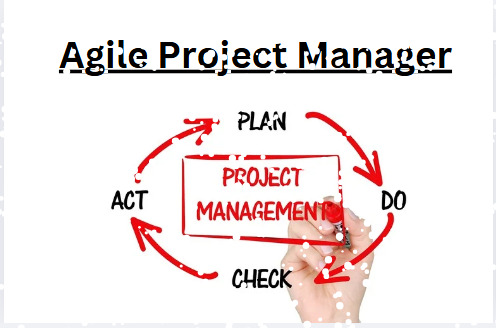#Agile Project manager
Explore tagged Tumblr posts
Text
Best Scrum Masterclass Online

0 notes
Text
Scrum Master vs Project Manager
The Scrum Master is dedicated to coaching and empowering the team to embrace Agile principles, ensuring collaborative and innovative work dynamics.

Meanwhile, the Project Manager assumes a more traditional role, concentrating on project goals, timelines, and resource management.

This knowledge aids aspiring professionals in choosing their career paths while helping businesses align roles with their project methodologies. Whether you choose the collaborative approach of a Scrum Master or the structured oversight of a Project Manager, understanding these roles is key to achieving project excellence.
0 notes
Text
How Agile Project Managers Drive Team Collaboration and Productivity
Agile project managers play a critical role in encouraging teamwork and increasing organizational productivity. They are essential to effectively managing projects and guaranteeing adherence to Agile principles.
The tasks, duties, and career paths of Agile Project Managers are examined in this article, along with how their leadership might change team dynamics. To give a comprehensive picture of the field, we will also discuss the job description and possible compensation for an Agile Project Manager.
In today’s fast-paced business environment, organizations constantly seek ways to enhance productivity and ensure seamless team collaboration. Enter the Agile Project Manager—a professional who serves as the cornerstone of modern project management, blending leadership, communication, and technical expertise to guide teams toward success.

0 notes
Text
Something that will never cease to amaze and surprise me is the sheer number of ways organizations have managed to package and brand project management styles that are just common sense.
#it me#agile?#you mean not managing products that need progressive development like a computer program#the same way you would manage one-and-done construction projects?
4 notes
·
View notes
Text
#agile#i&a#inspect and adapt#poetry#management#project management#product management#qa#rca#root cause analysis#systems analysis#test
2 notes
·
View notes
Text
Hello Agile Enthusiasts! 👋 We want to hear from you about your experiences with Agile Project Management Tools. Your insights will help us enhance Vabro to better suit your needs. Cast your vote and share your thoughts! 🌟
🔗 Visit www.vabro.com to know more.
3 notes
·
View notes
Text
The Katamari model of project management: roll up enough tasks into a sprint and have your PM launch that shit into space, simultaneously making it beautiful and forgetting it
6 notes
·
View notes
Text
Feedback sucks. It is horrible to give inside a project team, it can be painful to receive – even when it is praise, we are still uncomfortable. It is a problem, because if members of a software development team can’t give effective feedback to each other, and if we can’t receive it well, then we will struggle to be truly Agile with trust and communication.
2 notes
·
View notes
Text
Corporate developers often use Agile methodology, so don't beat yourself up for not having a planning system as an amateur! It might be helpful to consider adopting one though if you're a fountain of ideas or find it difficult to prioritise moment to moment.
So as a really high level summary of Agile development, the development team decides what gets focus each week or so. Cycle time varies widely from organization to organization based on what works best for the team, but usually the goal is to keep them at around a week or so. The development team maps out some measurable tasks (there's a clear beginning and end so it's "deliverable"), and commits to that handful of tasks for that defined time period, taking into account how much time each task is expected to last and then padding that estimate to account for unknowns and not overload themselves. Other aspirations/tasks pop up? No problem! They're logged, then placed in a backlog list (unless they're urgent and literally cannot wait) then they get reviewed in the next planning session to see how they fit into the priorities of the next cycle.
Kanban boards are a common accompaniment to Agile development. You can build personal ones for free on sites like Trello or ClickUp (they both have mobile apps too in case you have thoughts while away from your computer). You can even keep multiple boards for different purposes or types of tasks. Many people use kanban boards for non-development projects. Writing, crafts, filing your taxes, whatever- it's very flexible.
There are a lot of courses on how to use kanban boards but basically it's for tracking statuses of assigned tasks. Common columns are "Open" (tasks selected for a cycle), "Blocked" (tasks that can't continue until an issue is resolved), "In Progress", and "Done" but it's highly customizable.
It doesn't have to feel authoritarian and corporate. Many successful dev teams prefer Agile for the sense of structure and the ability to track what they learn about the ups and downs of each project. It's not a tool to judge personal performance and some Agile systems (like Scrum) even have strict rules against assigning blame. It's ultimately about patience, both for yourself and your projects.
In the end, these are your projects and you're doing them for yourself. You call the shots and there is absolutely no problem with setting tasks aside when you find something too hard for now, you fall out of love with a project, or just need time away for whatever reason. If it sucks hit the bricks (log what happened, throw it back into the backlog or close it completely, pick something more fulfilling). It happens all the time in the professional world, and you should allow yourself the same amount of grace if not even more when you're acting as an entire dev team on your own as a hobby you do for fun.
I didn't really take a lot of time to draft this, but I hope this is readable and that someone finds value in this. I'm more than happy to answer questions too so feel free to reach out.
i fucking hate my brain it wants to do so many things and it cant even focus on one of them. like its like "start an rpgmaker game!" "no, you should learn godot!" "what about your 3d models on blender??" "but you have that comic to work on!!" "you should also just draw more things in general" and im like SHUT UUUUPPP it feels like this

#not poto#in fact this clashes dramatically with the general flow of this blog. oh well.#...Erik probably sort of did project management in his architect career? idk#what I've learned from STEM job#agile development#project management#kanban#scrum
17K notes
·
View notes
Text
#Business Analyst Tools#BA Toolbox#Requirements Gathering#Business Analysis Templates#Process Modeling#Workflow Documentation#Stakeholder Management#Digital Transformation Tools#Business Analyst Resources#BA Frameworks#GQAT Tech BA Solutions#Agile BA Tools#Business Process Optimization#Productivity Tools for BAs#BA Best Practices#Proven Excellence#GQAT Tech Success Stories#QA Case Studies#Quality Assurance Achievements#Software Testing Results#Client Satisfaction#QA Best Practices#Project Excellence#Business Impact QA#Software Testing Portfolio#GQAT Testimonials#QA Metrics & Reporting#Trusted QA Services#Real-world QA Results#Quality Assurance Leadership
0 notes
Text
Scrum Master Project | The Agile Forum

Full ScrumMaster/Agile Project Manager/PO Skill Development with Power of safe scrum master certification. A Scrum Master serves as the servant leader and process coach for an agile team. They are the guardians of Scrum principles and practices, ensuring their proper implementation while fostering an environment of continuous improvement. Unlike traditional project managers, Scrum Masters don't manage the team directly but rather enable them to manage themselves effectively.
0 notes
Text
Scrum Master Mentorship
Become scrum master with Practical hands-on Training in scrum Kanban & XP on a JIRA Live project. scrum master mentorship program. Get scrum master experience. Situational scrum master interview questions, getting scrummastered,agile mentors,scrum coaching,scrum master as a coach,scrum master mentor
1 note
·
View note
Text
What is the role Agile Project Manager?
This article explores the tools and techniques essential for effective Agile project management. It outlines the roles and responsibilities of an Agile Project Manager, provides insights into what an Agile Project Manager does, and introduces key tools and techniques that streamline Agile processes. Additionally, the content highlights the Agile Project Manager roadmap, typical job descriptions, and salary expectations.

0 notes
Text
What Do Project Management Consultancy Services Actually Do? The Answer May Surprise You
When most people hear the term project management consultancy services, they assume it's all about timelines, task lists, and perhaps a few team meetings. But in reality, the role of project management consultants is far more impactful — and often underestimated.
Today’s business environment is defined by rapid change, increasing complexity, and fierce competition. In this climate, the ability to execute strategic initiatives smoothly and successfully is no longer a luxury — it’s a necessity. That’s where professionals like the Cognitude project management consulting services team step in. Their role goes far beyond traditional project tracking. They embed themselves into your business to transform your vision into results, often becoming the engine that drives sustainable growth.
So, what do these consultants actually do? Let’s uncover the real value of project management consulting services and why their contribution may be far greater than you think.
1. Strategic Project Planning and Scope Definition
At the foundation of every successful project lies strategic planning. Project management consultancy services don’t just manage what you already have — they help shape the entire project from the ground up. This includes defining project objectives, deliverables, timelines, budgets, and success metrics.
The Cognitude project management consultancy services team applies industry-specific frameworks to ensure your project isn’t just well-planned but fully aligned with business goals.
2. Risk Identification and Mitigation
Project risk is inevitable — but it’s manageable with the right expertise. Consultants use proven methods to perform detailed risk assessments early in the project lifecycle. They create contingency plans, allocate risk reserves, and monitor for red flags throughout execution.
Cognitude project management consulting services help organizations avoid budget overruns, schedule delays, and scope creep by anticipating problems before they occur.
3. Execution Support and Resource Management
One of the biggest values that project management consultancy services offer is hands-on execution support. They coordinate teams, manage vendors, resolve bottlenecks, and ensure tasks are delivered on time and to specification.
Efficient use of resources is a key factor in project success. By leveraging Cognitude project management consultancy services, companies can ensure that human, technological, and financial resources are utilized optimally without overburdening internal teams.
4. Agile and Scalable Project Delivery
In the modern world, agility is essential. Consultants are trained in methodologies like Agile, Scrum, Lean, and hybrid models that enable faster iteration, stakeholder feedback loops, and greater flexibility.
The Cognitude project management consulting services team implements scalable delivery frameworks, helping organizations handle both one-time initiatives and long-term project portfolios with equal effectiveness.
5. Stakeholder Engagement and Communication Strategy
Stakeholder misalignment is a silent killer of projects. That’s why project management consultancy services prioritize communication planning as a core function. They identify key stakeholders, define their expectations, and establish communication protocols that keep everyone informed.
Cognitude project management consultancy services are known for creating transparent, timely, and customized stakeholder reporting mechanisms that drive trust and accountability.
6. Performance Monitoring and Real-Time Reporting
Using dashboards, KPIs, and automated reporting systems, consultants track performance metrics to ensure everything stays on course. Real-time data empowers leadership to make better decisions quickly.
Cognitude project management consulting services don’t just tell you how your project is doing — they show you, with full transparency and evidence-based insights.
7. Governance and Compliance Assurance
For industries where compliance and documentation are critical, project management consultancy services introduce governance models that meet regulatory standards. They help prepare audit trails, document deliverables, and adhere to industry-specific frameworks such as ISO, ITIL, or PMBOK.
Cognitude project management consultancy services support businesses in maintaining integrity and compliance while still moving quickly.
8. Post-Project Analysis and Organizational Learning
The value of a project doesn’t end at delivery. Consultants conduct post-project evaluations to assess what went right, what didn’t, and how future projects can improve. These insights are used to build internal capabilities and repeatable frameworks for long-term success.
Cognitude project management consulting services enable organizations to evolve and grow through continuous learning and refinement.
9. Customization for Industry and Company Size
Unlike a one-size-fits-all approach, consultants tailor their strategies based on your industry, company maturity, and team dynamics. Whether you’re a fast-growing startup or a multinational enterprise, Cognitude project management consultancy services deliver customized support that fits your structure, budget, and objectives.
10. Driving Measurable Business Impact
Ultimately, consultants help drive results that matter. From reduced delivery times and lower costs to improved stakeholder satisfaction and increased agility, their impact touches every aspect of business performance.
The reason Cognitude project management consulting services are considered essential by leading organizations is simple — they make sure your strategy becomes reality, with minimal risk and maximum efficiency.
Final Thoughts
Far from being just task managers, today’s project management consultancy services act as strategic enablers. They bring together structure, agility, leadership, and clarity — turning complex projects into repeatable successes.
If you’ve ever wondered whether these services are worth the investment, consider this: the cost of failed or delayed projects is often far greater than the cost of expert guidance. Teams like Cognitude project management consulting services not only deliver projects but also empower businesses to grow, scale, and lead with confidence.
#project management consulting services#project management consultancy services#Cognitude project management consulting services#Cognitude project management consultancy services#strategic project planning#project delivery#risk mitigation#agile project management#stakeholder engagement#resource optimization#execution support#business transformation#project governance#consulting services#project performance
0 notes
Text
Unlock Strategic Success with Planview PPM Solutions by Winmill
In today’s fast-paced digital environment, organizations need more than just project management — they need a strategic approach to align every initiative with business goals. That’s where Planview Project Portfolio Management (PPM), delivered by Winmill PPM, makes a transformative impact. Winmill is a premier partner specializing in Planview PPM solutions, helping enterprises simplify complex portfolios, improve resource visibility, and drive better outcomes. Whether your focus is IT project governance, strategic planning, or agile transformation, Winmill tailors Planview's powerful tools to your specific needs. With Planview, organizations gain: ✅ Centralized Portfolio Management ✅ Real-Time Reporting and Dashboards ✅ Agile and Waterfall Integration ✅ Resource Optimization and Capacity Planning ✅ Improved PMO Efficiency Winmill stands apart by not just implementing software, but by empowering teams with strategy, training, and ongoing support to unlock the full value of their Planview investment. Why Choose Winmill for Planview Implementation?
20+ years of PPM experience
Certified Planview consultants
Proven success across industries including healthcare, finance, and government
Scalable solutions for organizations of all sizes Explore how Winmill can elevate your project execution and strategic alignment. 👉 Learn More: https://ppm.winmill.com/
#planview software#broadcom clarity ppm#winmillppm#clarity project management tool#marketing#agile software development#resources#software engineering#clarity ppm
0 notes
Text
IT projects fail for all kinds of reasons — but lack of structure tops the list. No clear roadmap. No visibility. Missed deadlines.
That’s where a solid project management framework makes all the difference.
At XB Software, we’ve learned (sometimes the hard way) that PM isn't just task lists — it's the operating system of successful delivery.
✅ This article breaks down our proven approach, why it works, and how you can adopt it — whether you’re building an MVP or modernizing legacy software.
#project management#agile project management#outsourcing#software development#web development#staff augmentation#custom software development#it staff augmentation#custom software solutions#it staffing company#it staff offshoring#custom software
0 notes